10 Best Undervalued Large Cap US Stocks - Value Sense 2025
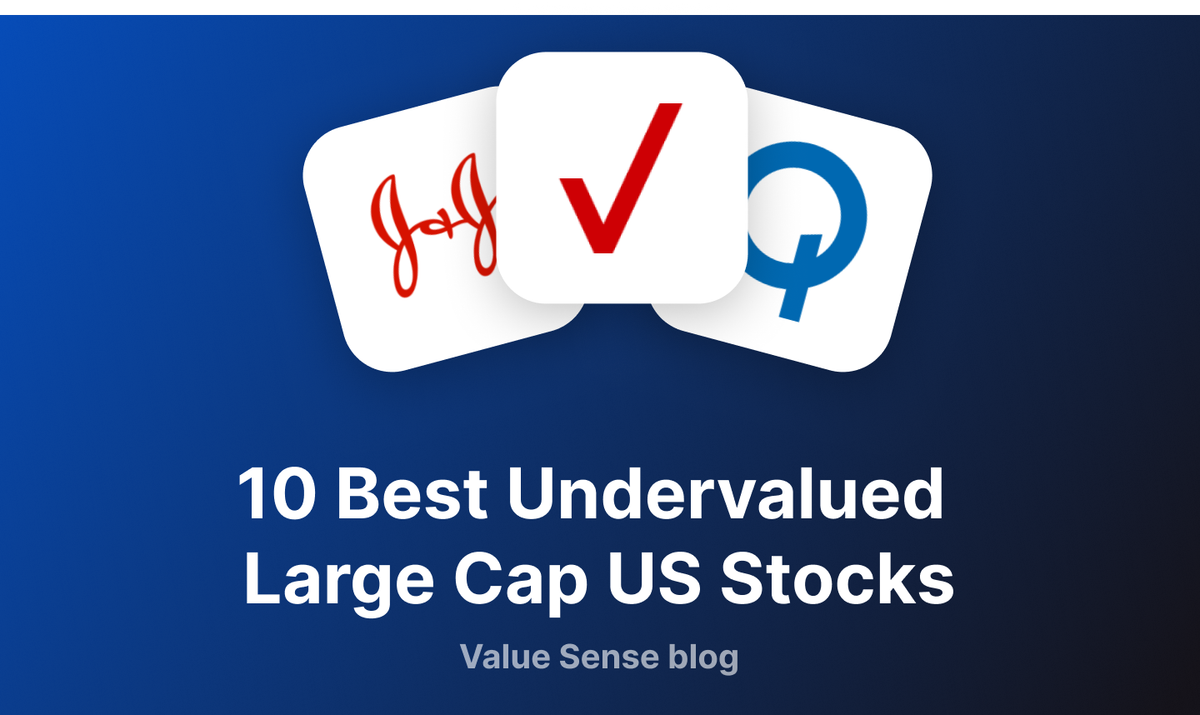
Welcome to the Value Sense Blog, your resource for insights on the stock market! At Value Sense, we focus on intrinsic value tools and offer stock ideas with undervalued companies. Dive into our research products and learn more about our unique approach at valuesense.io
Explore diverse stock ideas covering technology, healthcare, and commodities sectors. Our insights are crafted to help investors spot opportunities in undervalued growth stocks, enhancing potential returns. Visit us to see evaluations and in-depth market research.
The Strategic Advantage of Undervalued Large Cap Investing
Large cap stocks with market capitalizations exceeding $10 billion represent the most established and financially stable companies in the US market, offering investors exposure to market leaders with proven business models, substantial competitive moats, and predictable cash flows. When these quality companies trade below their intrinsic value, they create exceptional opportunities for conservative investors seeking both capital appreciation and downside protection.
Undervalued Large Cap Selection Criteria:
- Market Cap >$10B: Ensuring substantial scale, liquidity, and institutional quality
- Intrinsic Value - Undervalued Status: Trading below calculated fair value based on fundamental analysis
- Quality Business Fundamentals: Strong competitive positioning and financial metrics
- Proven Track Records: Established companies with demonstrated execution capability
Top 10 Undervalued Large Cap US Stocks - Ranked by Undervaluation Percentage
1. Verizon Communications Inc. (VZ) - 169.5% Undervalued ⭐
Complete Analysis:
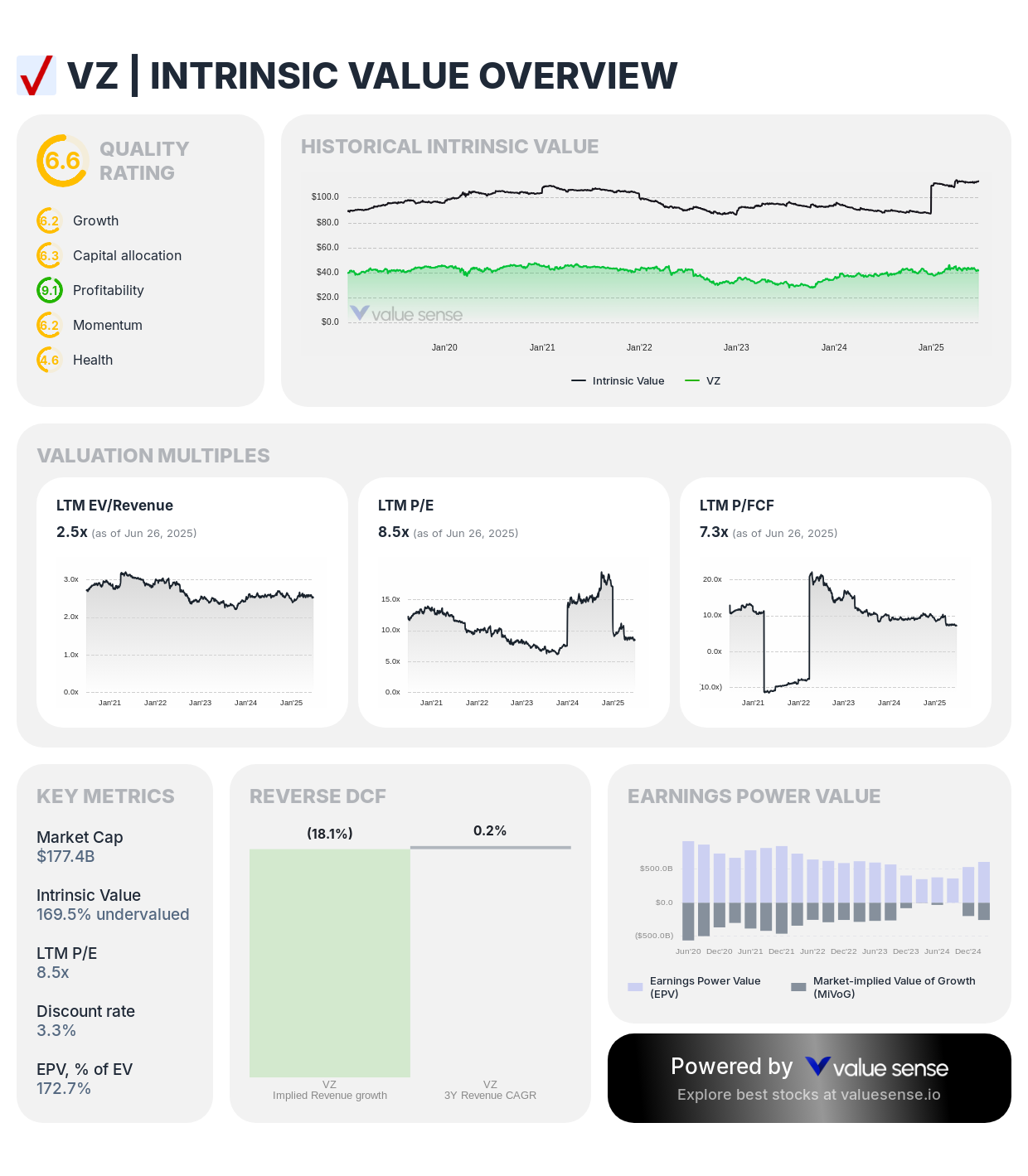
- Market Cap: $177.4B
- Quality Rating: 6.5 (Strong)
- Intrinsic Value: $113.4
- Undervaluation: 169.5%
- 1-Year Return: 7.8%
- Revenue: $135.3B
- Free Cash Flow: $24.4B
- Revenue Growth: 0.9%
Investment Thesis: Verizon represents the most significantly undervalued large cap opportunity with 169.5% discount to intrinsic value, reflecting the telecommunications leader's essential infrastructure assets and predictable cash flows. Despite modest revenue growth, Verizon's network quality leadership, substantial free cash flow generation, and attractive dividend yield create exceptional value at current prices.
Why It's Undervalued: Market concerns about wireless competition and capital expenditure requirements have created temporary undervaluation of Verizon's essential infrastructure assets. The company's network quality advantages, customer loyalty, and 5G investment positioning support substantially higher valuations than current market pricing reflects.
Investment Highlights:
- Leading wireless network quality with premium customer base and pricing power
- Substantial free cash flow generation ($24.4B) supporting attractive dividend yields
- Essential telecommunications infrastructure with defensive characteristics
- 5G network investments creating competitive advantages and growth opportunities
2. UnitedHealth Group Incorporated (UNH) - 114.3% Undervalued
Complete Analysis:
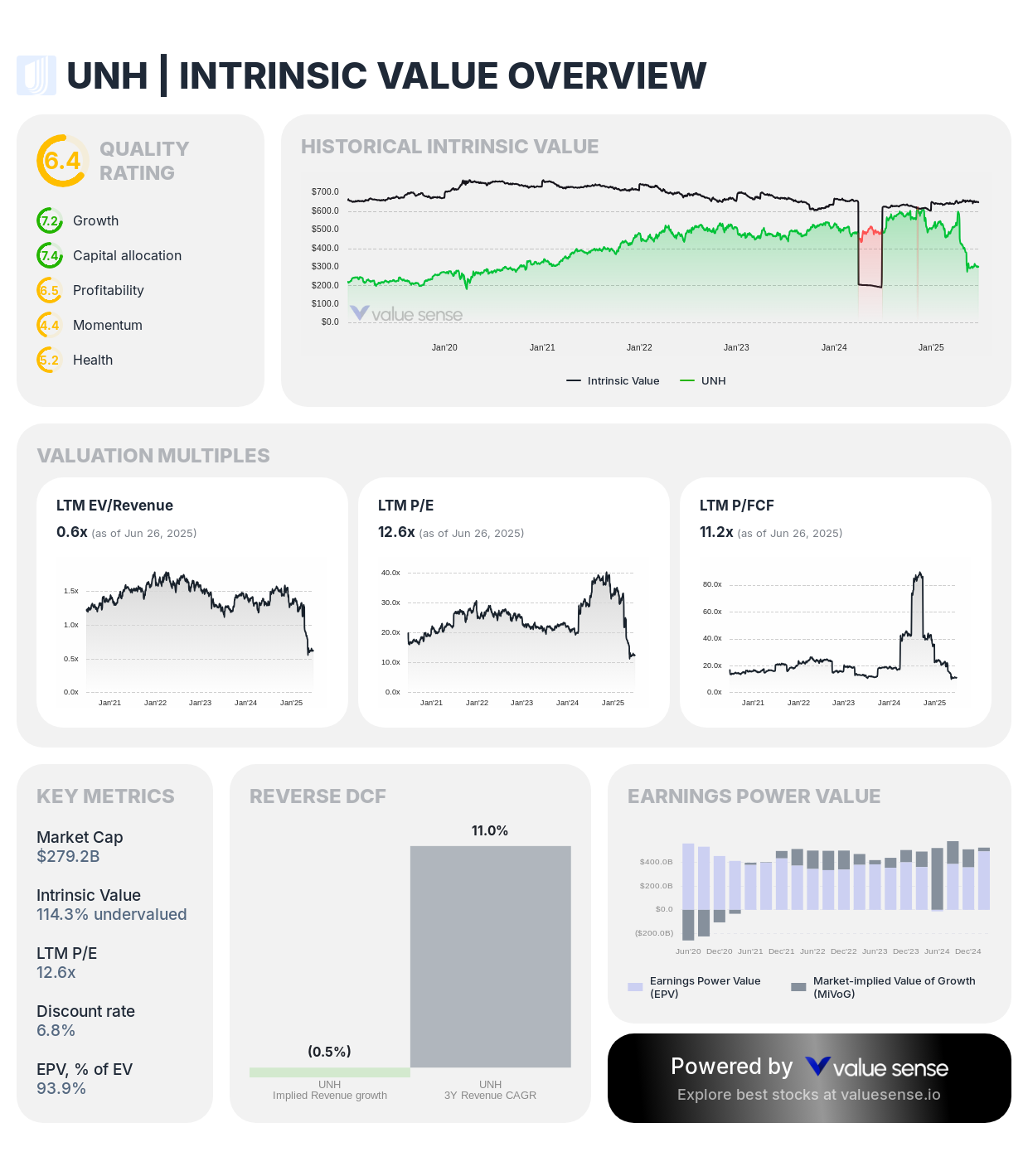
- Market Cap: $279.2B
- Quality Rating: 6.4 (Strong)
- Intrinsic Value: $648.5
- Undervaluation: 114.3%
- 1-Year Return: (37.0%)
- Revenue: $407.4B
- Free Cash Flow: $24.9B
- Revenue Growth: 8.6%
Investment Thesis: UnitedHealth demonstrates exceptional undervaluation at 114.3% below intrinsic worth, representing one of the most compelling opportunities among large cap healthcare companies. As America's largest health insurer with rapidly growing Optum services, UnitedHealth combines defensive characteristics with substantial growth potential through demographic trends and integrated care delivery.
Why It's Undervalued: Recent political concerns about healthcare policy and temporary operational challenges have created significant undervaluation of UnitedHealth's exceptional business model. The company's integrated healthcare approach, scale advantages, and demographic tailwinds support substantially higher valuations.
Investment Highlights:
- Dominant position in health insurance with scale advantages and pricing power
- Optum health services expansion creating higher-margin revenue streams
- Aging population demographics driving sustained healthcare demand growth
- Integrated care delivery model improving outcomes while reducing costs
3. Uber Technologies, Inc. (UBER) - 99.8% Undervalued
Complete Analysis:
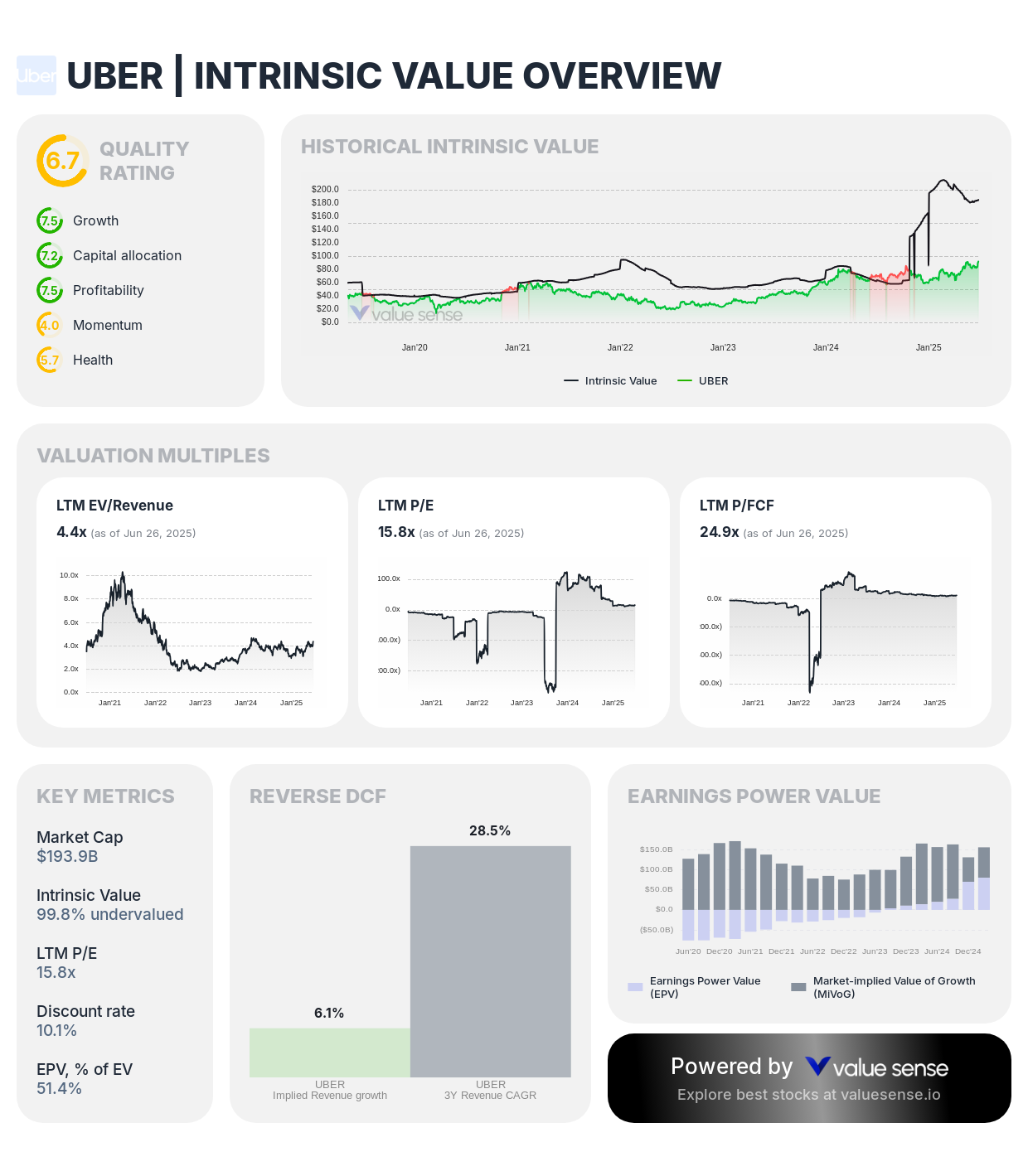
- Market Cap: $193.9B
- Quality Rating: 6.7 (Strong)
- Intrinsic Value: $186.1
- Undervaluation: 99.8%
- 1-Year Return: 31.4%
- Revenue: $45.4B
- Free Cash Flow: $7,786.0M
- Revenue Growth: 17.6%
Investment Thesis: Uber presents substantial undervaluation at 99.8% below intrinsic value with strong quality rating of 6.7, reflecting the mobility and delivery platform's transformation to profitability and exceptional growth potential. The company's network effects, global scale, and expanding services create sustainable competitive advantages that current pricing underestimates.
Why It's Undervalued: Market skepticism about ride-sharing profitability and competitive dynamics has created undervaluation of Uber's platform advantages and operational improvements. The company's successful transition to cash flow positive operations and expanding addressable markets support higher valuations.
Investment Highlights:
- Global mobility platform with network effects and scale advantages
- Successful transformation to profitability with strong free cash flow generation
- Expanding services including delivery, freight, and autonomous vehicle partnerships
- International expansion opportunities in underserved markets
4. QUALCOMM Incorporated (QCOM) - 68.8% Undervalued
Complete Analysis:
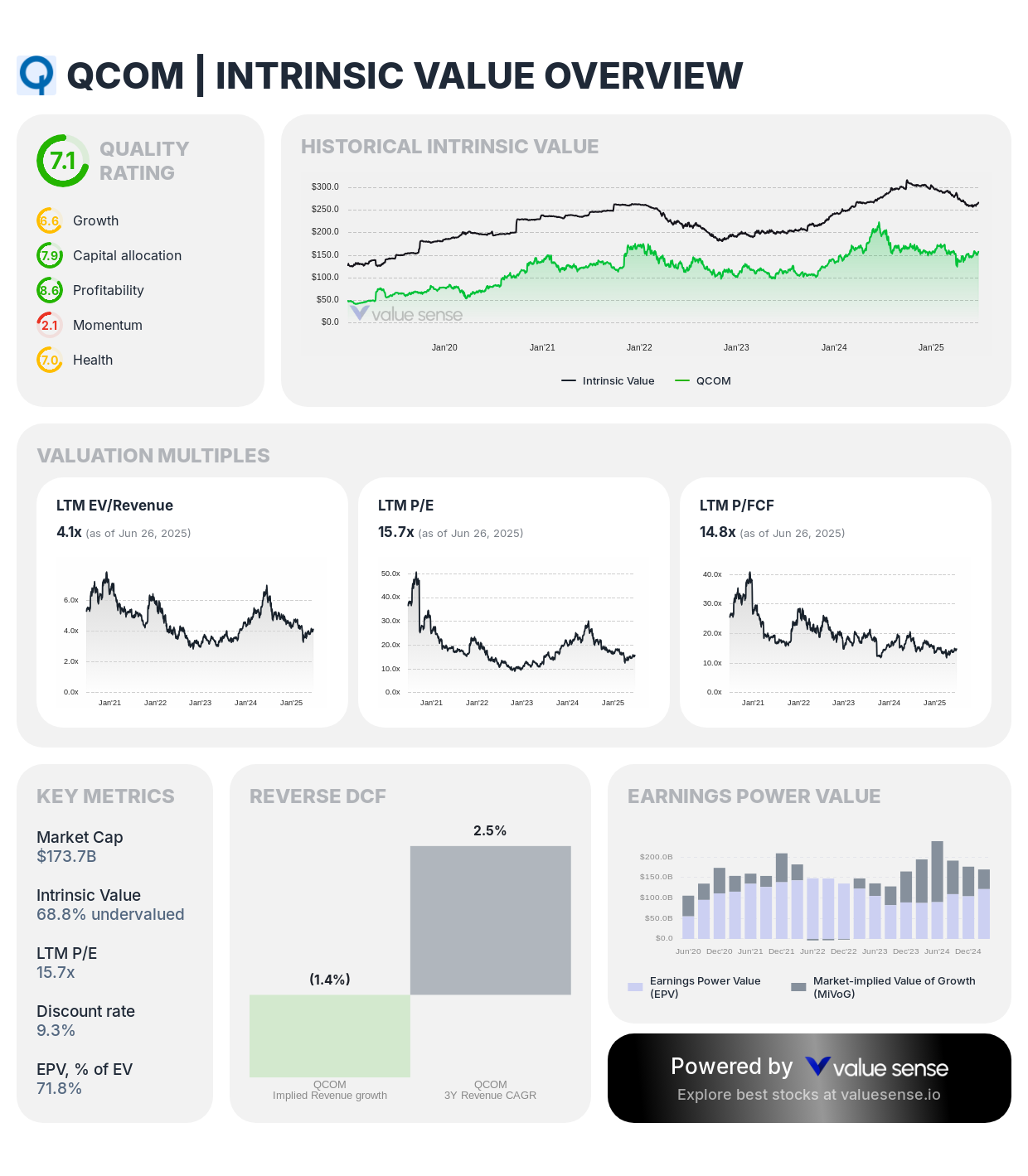
- Market Cap: $173.7B
- Quality Rating: 7.1 (Strong)
- Intrinsic Value: $267.0
- Undervaluation: 68.8%
- 1-Year Return: (18.6%)
- Revenue: $42.3B
- Free Cash Flow: $11.7B
- Revenue Growth: 16.1%
Investment Thesis: QUALCOMM demonstrates significant undervaluation at 68.8% below intrinsic worth with strong quality rating of 7.1, reflecting the semiconductor leader's dominant position in wireless technology and expanding market opportunities. The company's extensive patent portfolio and 5G leadership create substantial competitive advantages that current pricing fails to recognize.
Why It's Undervalued: Concerns about smartphone market maturity and Chinese competition have created temporary undervaluation of QUALCOMM's technological leadership and expanding addressable markets. The company's diversification beyond smartphones and 5G infrastructure positioning support higher valuations.
Investment Highlights:
- Dominant position in wireless technology with extensive patent portfolio
- 5G infrastructure leadership providing long-term growth opportunities
- Expansion beyond smartphones into automotive, IoT, and edge computing
- High-margin licensing business providing recurring revenue streams
5. AbbVie Inc. (ABBV) - 54.7% Undervalued
Complete Analysis:
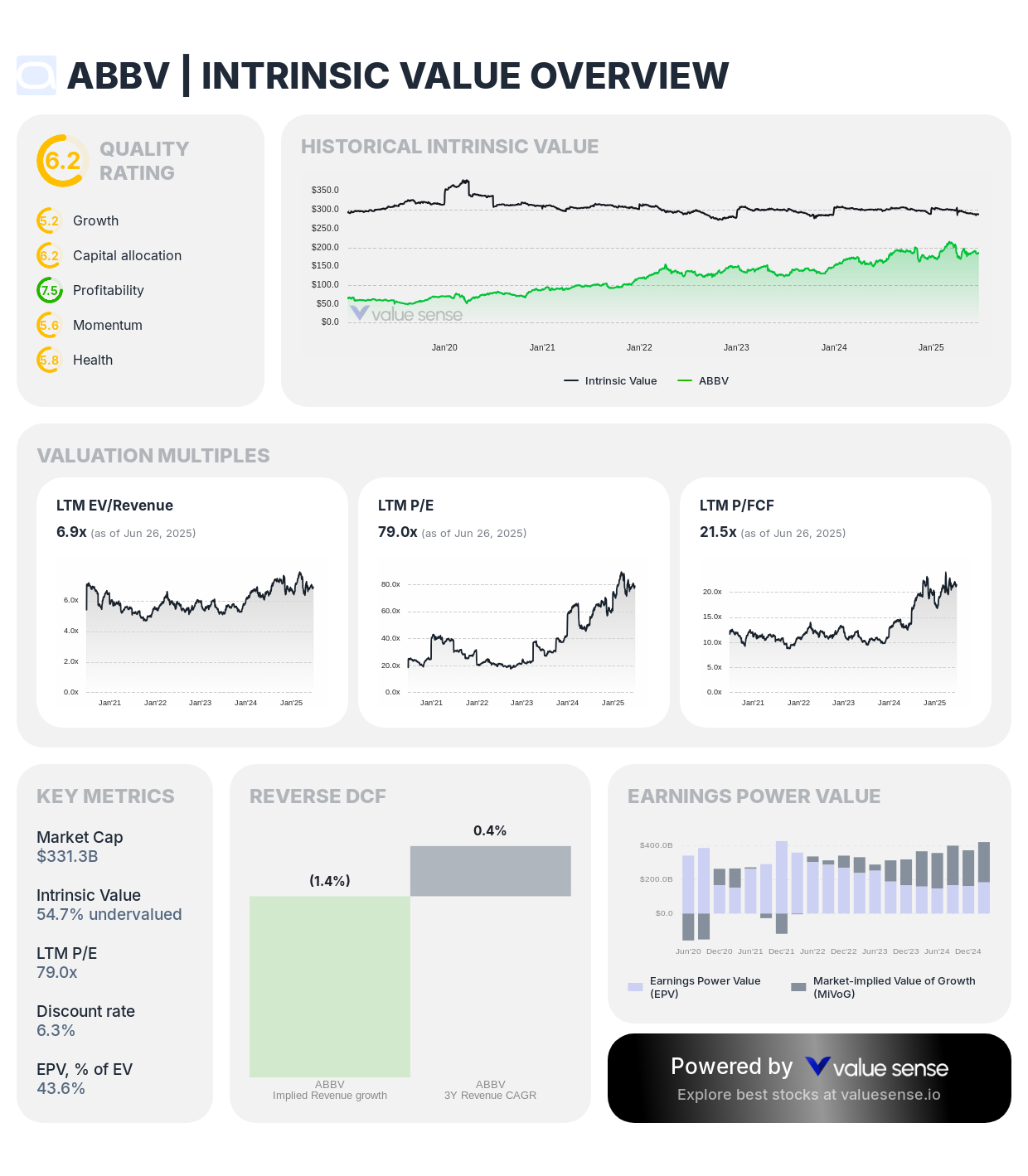
- Market Cap: $331.3B
- Quality Rating: 6.2 (Strong)
- Intrinsic Value: $288.9
- Undervaluation: 54.7%
- 1-Year Return: 12.1%
- Revenue: $57.4B
- Free Cash Flow: $15.4B
- Revenue Growth: 5.4%
Investment Thesis: AbbVie presents solid undervaluation at 54.7% below intrinsic value, reflecting the pharmaceutical company's successful diversification beyond Humira and robust pipeline development. The company's breakthrough treatments in immunology, oncology, and neuroscience create substantial value that current market pricing underestimates.
Why It's Undervalued: Market concerns about Humira patent cliff and competitive pressures have created undervaluation of AbbVie's diversified portfolio and pipeline potential. The company's successful strategic acquisitions and innovative treatments support higher valuations.
Investment Highlights:
- Diversified pharmaceutical portfolio reducing single-product dependency
- Robust pipeline with multiple potential blockbuster treatments
- Strong free cash flow generation supporting dividend growth and R&D investment
- Strategic acquisitions enhancing competitive positioning in key therapeutic areas
6. Merck & Co., Inc. (MRK) - 33.3% Undervalued
Complete Analysis:
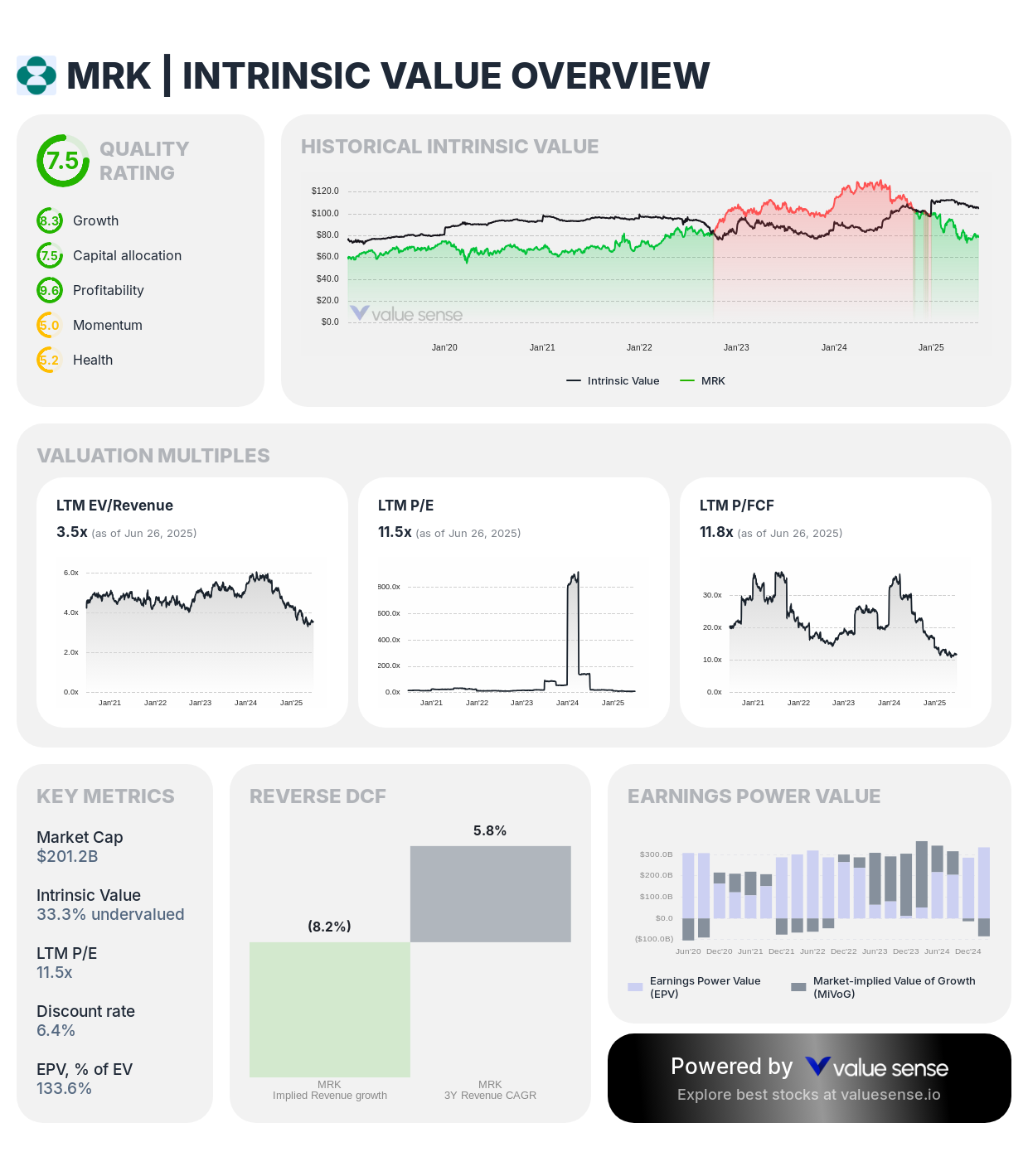
- Market Cap: $201.2B
- Quality Rating: 7.5 (Strong)
- Intrinsic Value: $105.1
- Undervaluation: 33.3%
- 1-Year Return: (39.2%)
- Revenue: $63.9B
- Free Cash Flow: $17.0B
- Revenue Growth: 4.1%
Investment Thesis: Merck demonstrates solid undervaluation at 33.3% below intrinsic worth with exceptional quality rating of 7.5, reflecting the pharmaceutical leader's strong competitive positioning and innovative pipeline. The company's leadership in oncology and vaccines creates sustainable competitive advantages supporting higher valuations.
Why It's Undervalued: Temporary concerns about key product competition and pipeline execution have created undervaluation of Merck's exceptional research capabilities and market positions. The company's innovation track record and therapeutic leadership support value realization.
Investment Highlights:
- Leadership position in oncology with Keytruda and expanding pipeline
- Strong vaccine portfolio providing defensive revenue streams
- Exceptional research and development capabilities with proven innovation track record
- Conservative balance sheet supporting strategic investments and shareholder returns
7. Abbott Laboratories (ABT) - 29.4% Undervalued
Complete Analysis:
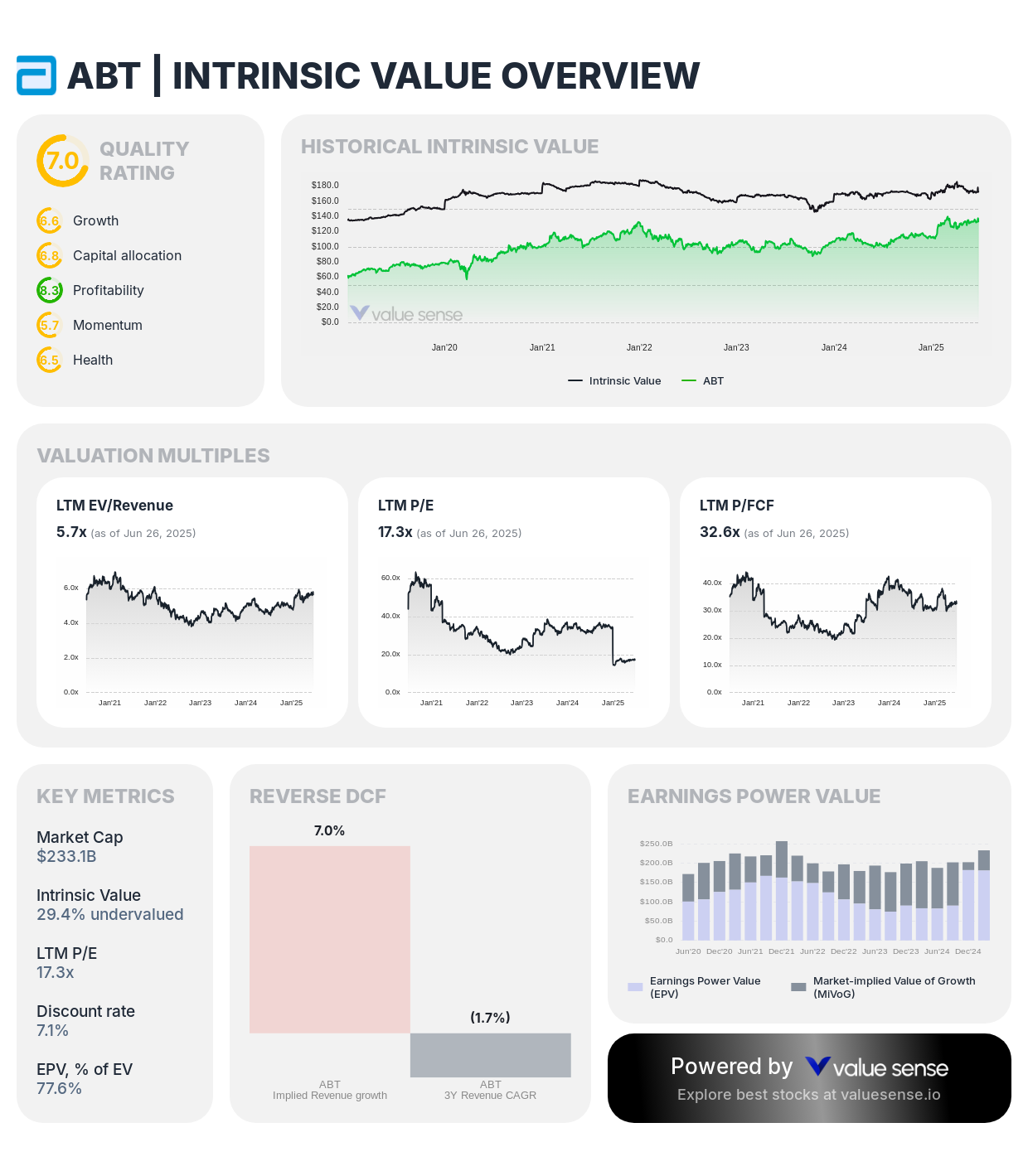
- Market Cap: $233.1B
- Quality Rating: 7.0 (Strong)
- Intrinsic Value: $173.0
- Undervaluation: 29.4%
- 1-Year Return: 29.4%
- Revenue: $42.3B
- Free Cash Flow: $7,141.0M
- Revenue Growth: 5.0%
Investment Thesis: Abbott presents attractive undervaluation at 29.4% below intrinsic value with strong quality rating of 7.0, reflecting the diversified healthcare company's leadership across medical devices, diagnostics, and nutrition. The company's innovative product portfolio and global expansion create sustainable growth opportunities.
Why It's Undervalued: Despite strong performance, Abbott's current valuation fails to fully reflect its innovation pipeline and market expansion opportunities. The company's defensive characteristics and growth potential support higher valuations.
Investment Highlights:
- Leadership in continuous glucose monitoring with FreeStyle Libre global expansion
- Diversified healthcare portfolio providing stability across economic cycles
- Strong innovation pipeline in medical devices and diagnostics
- International expansion opportunities in emerging healthcare markets
8. PepsiCo, Inc. (PEP) - 23.5% Undervalued
Complete Analysis:
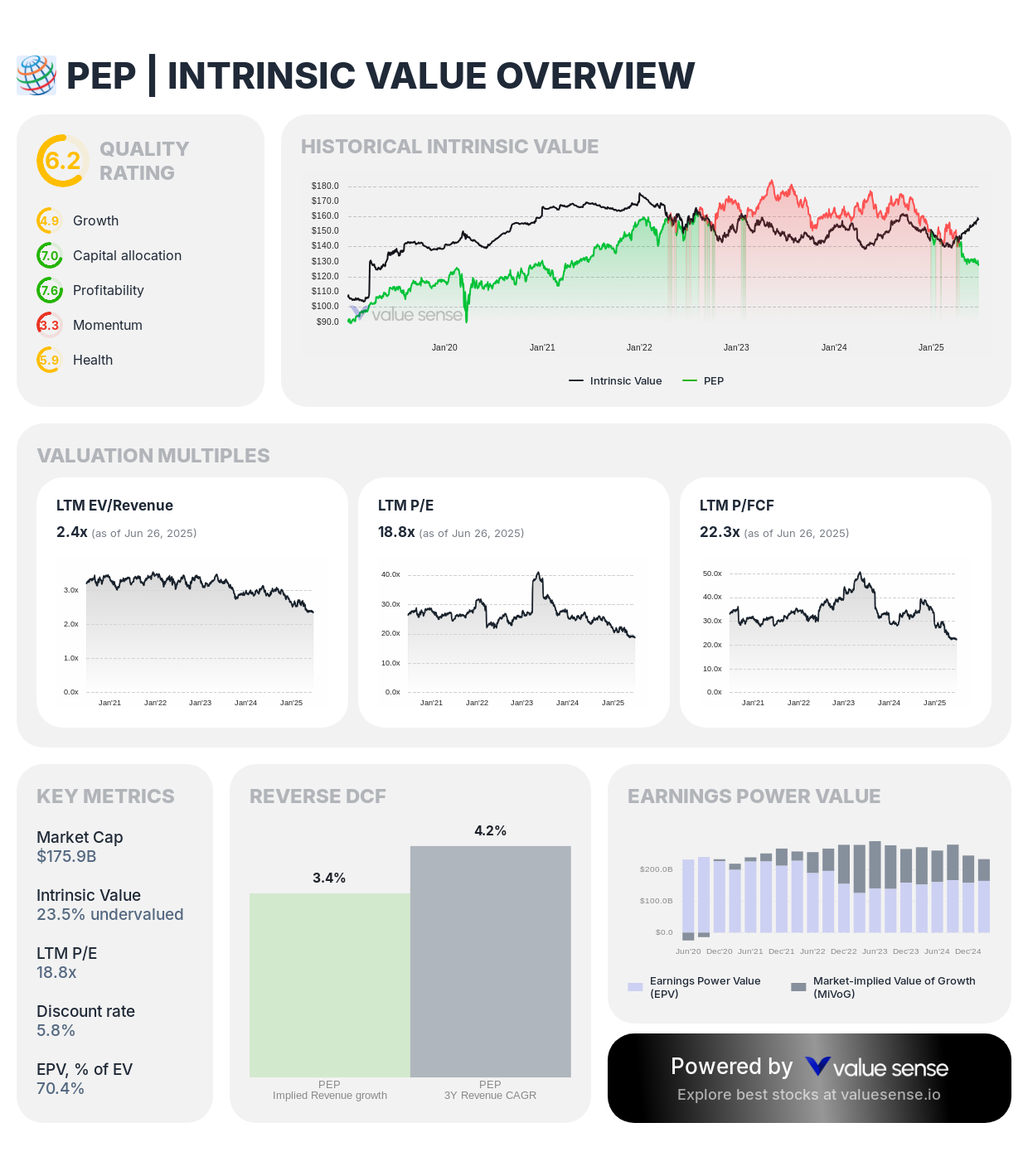
- Market Cap: $175.9B
- Quality Rating: 6.2 (Strong)
- Intrinsic Value: $158.3
- Undervaluation: 23.5%
- 1-Year Return: (21.2%)
- Revenue: $91.5B
- Free Cash Flow: $7,871.0M
- Revenue Growth: (0.4%)
Investment Thesis: PepsiCo demonstrates moderate undervaluation at 23.5% below intrinsic worth, reflecting the consumer goods leader's strong brand portfolio and global distribution advantages. The company's defensive characteristics and consistent cash generation create value despite modest growth challenges.
Why It's Undervalued: Concerns about consumer spending and health trends have created temporary undervaluation of PepsiCo's brand strength and market positioning. The company's diversified portfolio and international expansion support higher valuations.
Investment Highlights:
- Strong brand portfolio with global recognition and consumer loyalty
- Diversified revenue streams across beverages and snacks reducing single-category risk
- Consistent cash generation supporting dividend growth and strategic investments
- International expansion opportunities in emerging markets
9. Johnson & Johnson (JNJ) - 23.2% Undervalued
Complete Analysis:
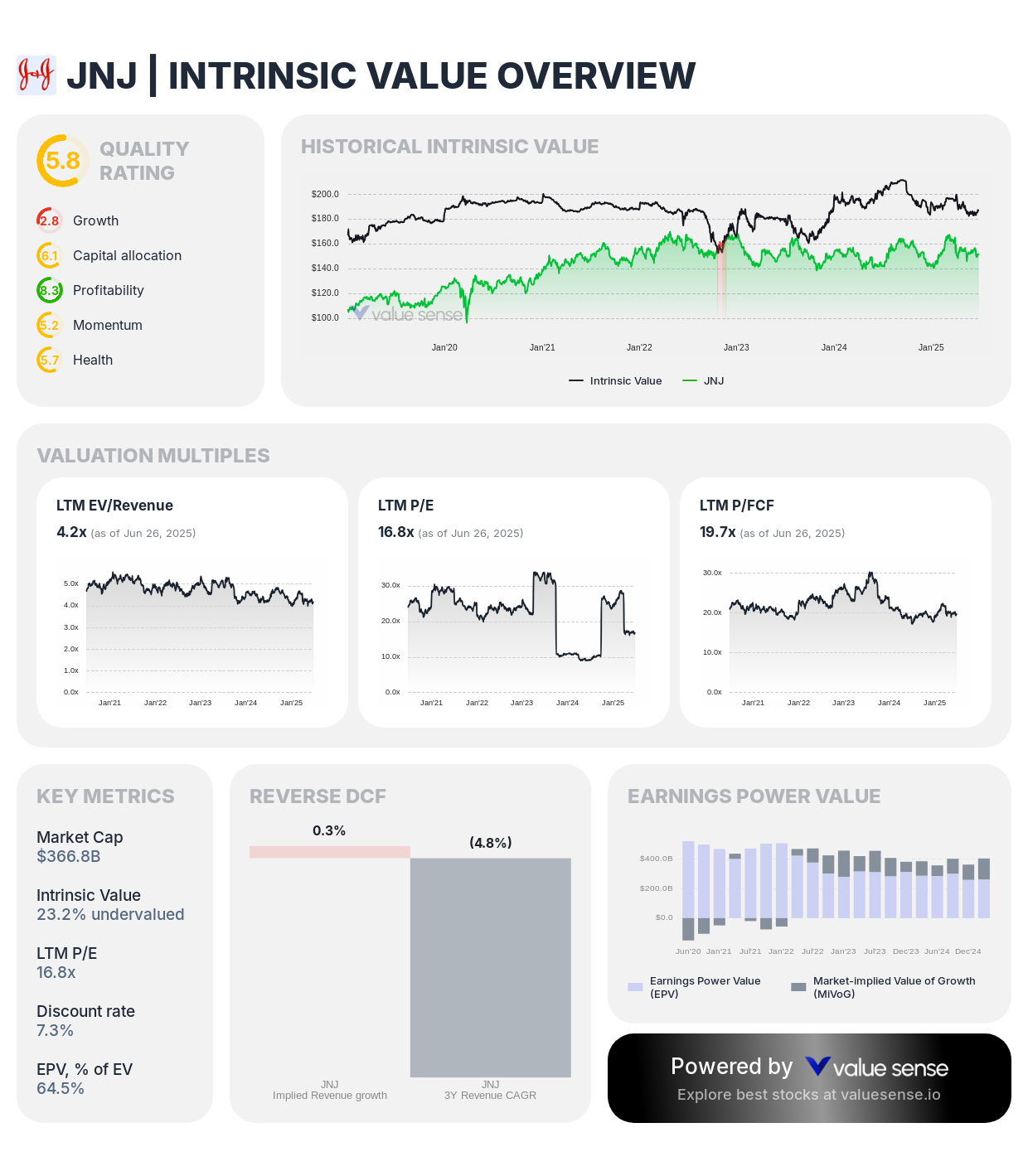
- Market Cap: $366.8B
- Quality Rating: 6.4 (Strong)
- Intrinsic Value: $187.2
- Undervaluation: 23.2%
- 1-Year Return: 6.0%
- Revenue: $82.0B
- Free Cash Flow: $18.6B
- Revenue Growth: (4.3%)
Investment Thesis: Johnson & Johnson presents moderate undervaluation at 23.2% below intrinsic value, reflecting the healthcare giant's diversified operations and Dividend Aristocrat status. Despite recent challenges, J&J's pharmaceutical pipeline and defensive characteristics create value opportunities.
Why It's Undervalued: Recent divestitures and legal challenges have created temporary undervaluation of J&J's core pharmaceutical and medical device businesses. The company's innovation capabilities and market positions support higher valuations.
Investment Highlights:
- Diversified healthcare portfolio across pharmaceuticals and medical devices
- Dividend Aristocrat status with 62 consecutive years of dividend increases
- Strong pharmaceutical pipeline focused on high-growth therapeutic areas
- Defensive business characteristics providing stability during economic uncertainty
10. Cisco Systems, Inc. (CSCO) - 2.4% Undervalued
Complete Analysis:
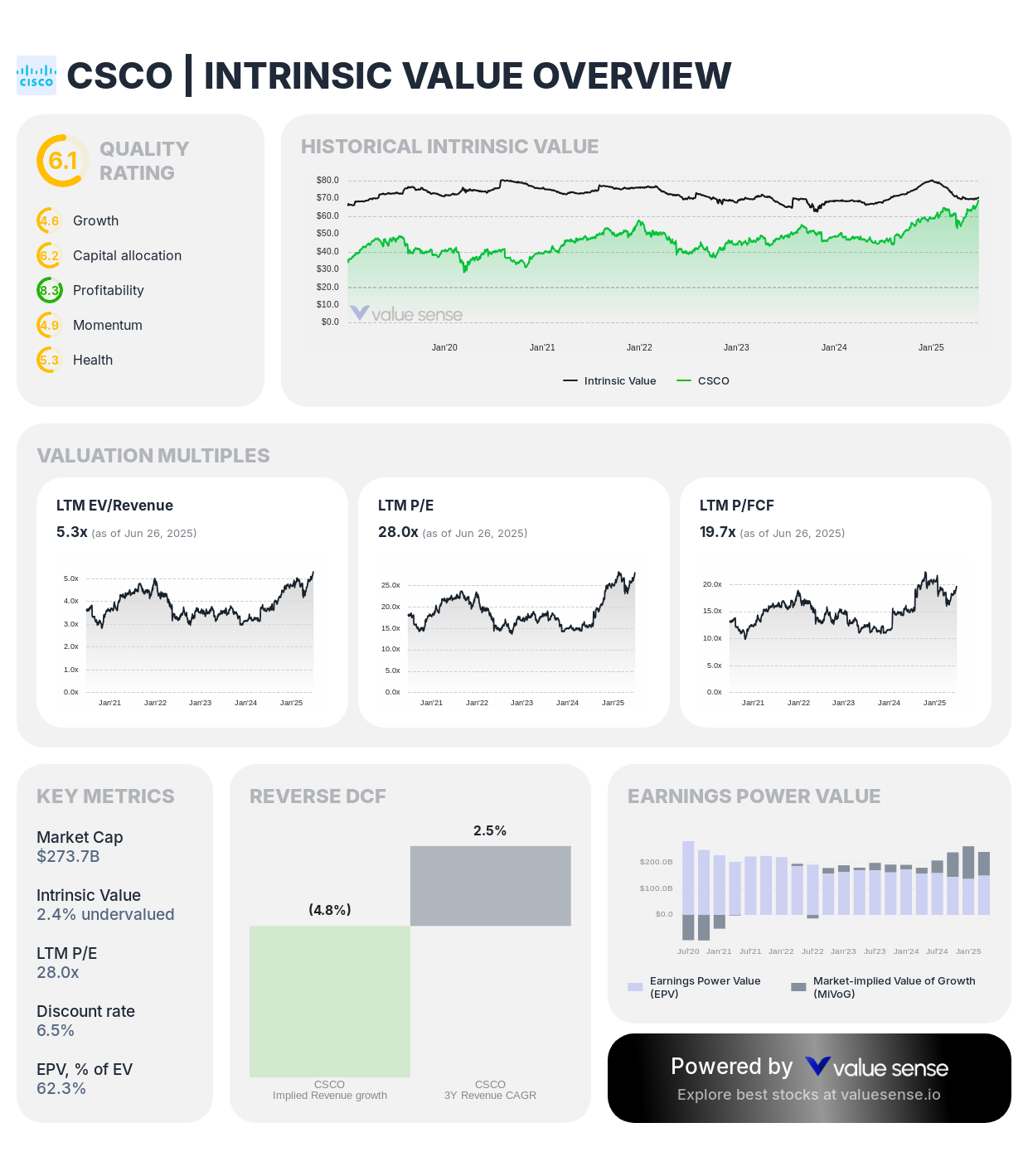
- Market Cap: $273.7B
- Quality Rating: 6.1 (Strong)
- Intrinsic Value: $70.6
- Undervaluation: 2.4%
- 1-Year Return: 50.5%
- Revenue: $55.6B
- Free Cash Flow: $13.9B
- Revenue Growth: 0.5%
Investment Thesis: Cisco demonstrates modest undervaluation at 2.4% below intrinsic worth, representing the closest to fair value among our undervalued selections. The networking technology leader's transformation toward software and services creates more predictable revenue streams while maintaining market leadership.
Why It's Undervalued: Despite strong recent performance, Cisco's transformation to software and services business model supports slightly higher valuations. The company's essential infrastructure positioning provides defensive value.
Investment Highlights:
- Market leadership in networking infrastructure with high switching costs
- Successful transition to software and subscription-based revenue models
- Essential role in cybersecurity and 5G infrastructure development
- Strong balance sheet and consistent dividend payments providing defensive characteristics
Large Cap Value Investment Strategy
Prioritize Exceptional Undervaluation with Quality: Focus on companies combining substantial undervaluation with strong business fundamentals. Verizon (169.5% undervalued) and UnitedHealth (114.3% undervalued) offer exceptional value opportunities with defensive characteristics and quality operations.
Diversify Across Defensive Sectors: Large cap undervalued opportunities span telecommunications (Verizon), healthcare (UnitedHealth, AbbVie, Merck, Abbott, J&J), technology (Uber, QUALCOMM, Cisco), and consumer goods (PepsiCo), providing balanced exposure to different economic cycles and growth drivers.
Emphasize Dividend Sustainability: Many large cap undervalued companies offer attractive dividend yields with sustainable payout ratios. Focus on companies with strong free cash flow generation and conservative capital structures supporting long-term dividend growth.
Long-Term Holding for Value Realization: Large cap value realization often requires patience as these established companies may take time for market recognition of intrinsic worth. Maintain long-term perspective and focus on business fundamentals rather than short-term price movements.
Key Takeaways for Large Cap Value Investors
✅ Exceptional Value Leaders: Verizon (169.5%) and UnitedHealth (114.3%) offer extraordinary undervaluation with quality fundamentals
✅ Quality Ratings: All companies maintain ratings above 6.0 indicating strong business fundamentals and competitive positioning
✅ Diversified Opportunities: Undervalued large caps span healthcare, telecommunications, technology, and consumer sectors
✅ Cash Flow Strength: All companies demonstrate substantial free cash flow generation supporting dividends and strategic investments
✅ Defensive Characteristics: Large cap companies provide stability and downside protection during market volatility
Explore More Investment Opportunities
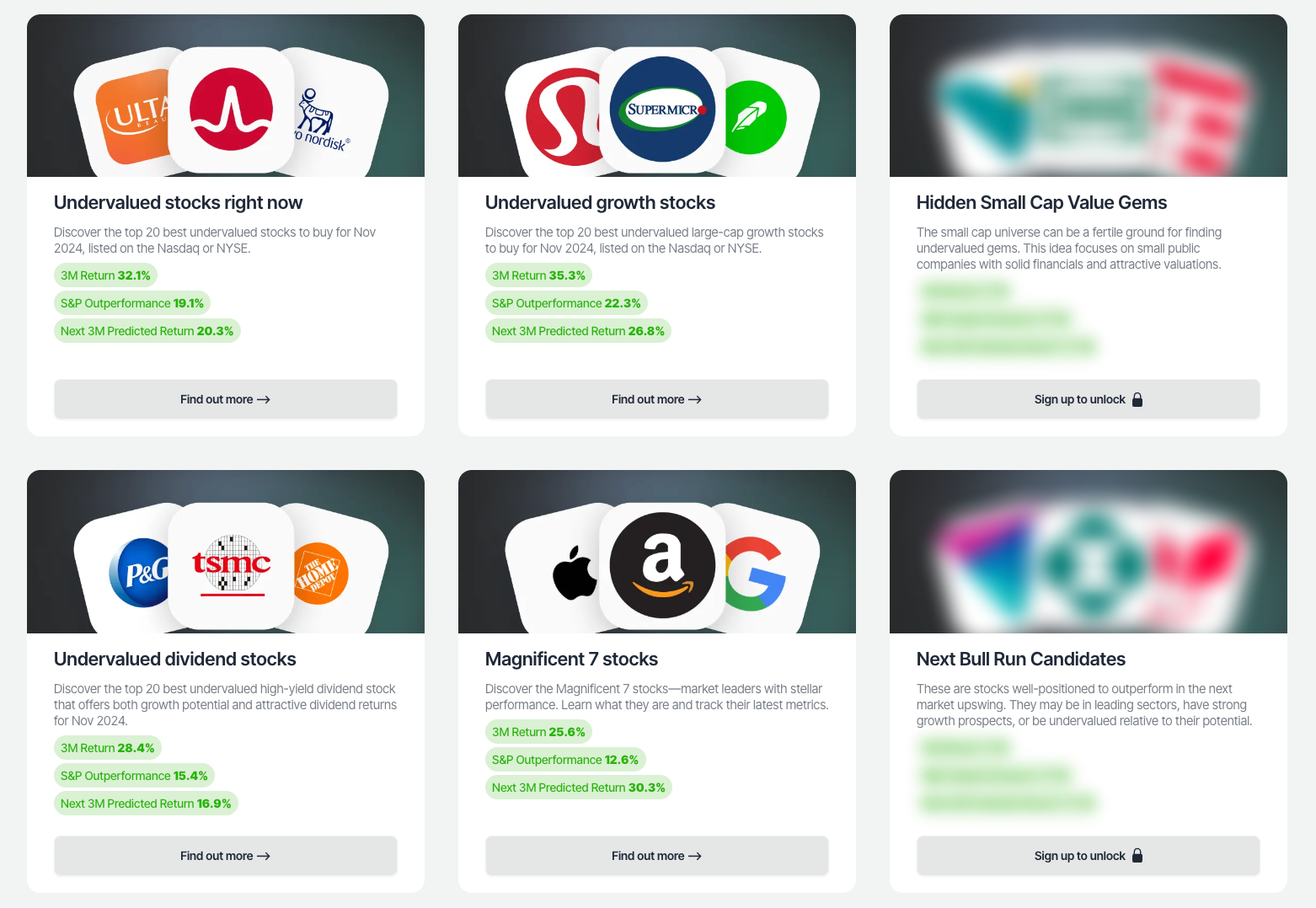
For investors seeking undervalued companies with high fundamental quality, our analytics team provides curated stock lists:
📌 50 Undervalued Stocks (Best overall value plays for 2025)
📌 50 Undervalued Dividend Stocks (For income-focused investors)
📌 50 Undervalued Growth Stocks (High-growth potential with strong fundamentals)
🔍 Check out these stocks on the Value Sense platform for free!
More Articles You Might Like
📖 8 Best Fair Value Stocks Trading Near Intrinsic Worth
📖 10 Best Compounding Quality Stocks
📖 7 Best Undervalued Cheap Stocks Under $20
FAQ About Large Cap Value Investing
What advantages do large cap stocks offer compared to smaller companies?
Large cap stocks provide several advantages including greater financial stability due to established business models, superior liquidity enabling easy entry and exit, lower volatility due to diversified operations, and institutional quality management teams. Companies like UnitedHealth and Johnson & Johnson demonstrate the defensive characteristics and predictable cash flows that make large caps attractive for conservative investors seeking steady wealth accumulation with reduced downside risk.
Why do established large cap companies sometimes trade below intrinsic value?
Large cap companies may trade below intrinsic value due to temporary business challenges, sector-wide pessimism, regulatory concerns, or market rotation toward growth stocks. Verizon's 169.5% undervaluation reflects telecommunications sector concerns despite strong fundamentals, while UnitedHealth's discount stems from healthcare policy uncertainty. These situations create opportunities when underlying business quality remains intact but market sentiment creates temporary mispricings.
How should investors evaluate dividend sustainability in undervalued large caps?
Dividend sustainability analysis should focus on free cash flow coverage, payout ratios, debt levels, and business stability. Companies like Johnson & Johnson with 62 consecutive dividend increases demonstrate exceptional sustainability, while strong free cash flow generators like Verizon and Abbott provide excellent coverage ratios. Evaluate whether undervaluation reflects temporary challenges or structural issues that could impact future dividend capacity.
What role should large cap value stocks play in portfolio construction?
Large cap value stocks typically serve as portfolio foundations, providing stability, income, and defensive characteristics during market volatility. These companies often represent 40-60% of equity allocations for conservative investors, complemented by growth stocks and international exposure. The predictable nature of large cap businesses makes them ideal for investors seeking steady wealth accumulation with lower volatility than smaller, more speculative companies.
How do large cap value stocks perform during different economic cycles?
Large cap value stocks generally outperform during economic uncertainty due to their defensive characteristics, established market positions, and consistent cash flows. Companies like PepsiCo and Abbott demonstrate resilience during recessions through essential products and services, while telecommunications and healthcare companies provide stability through economic cycles. However, they may underperform during growth phases when investors favor higher-growth opportunities over established businesses.
Important Note on Large Cap Value Investing: Large cap value stocks offer stability and income but may provide more modest returns compared to growth opportunities. These investments emphasize business quality and dividend sustainability over rapid appreciation, requiring patience for value realization through operational performance and market recognition. Success depends on fundamental analysis and long-term perspective rather than timing market cycles.
Disclaimer: This analysis is for informational purposes only and should not be considered personalized investment advice. Intrinsic value calculations are based on current financial data and assumptions that may change with new information. Always conduct thorough research and consult with qualified financial advisors before making investment decisions.
